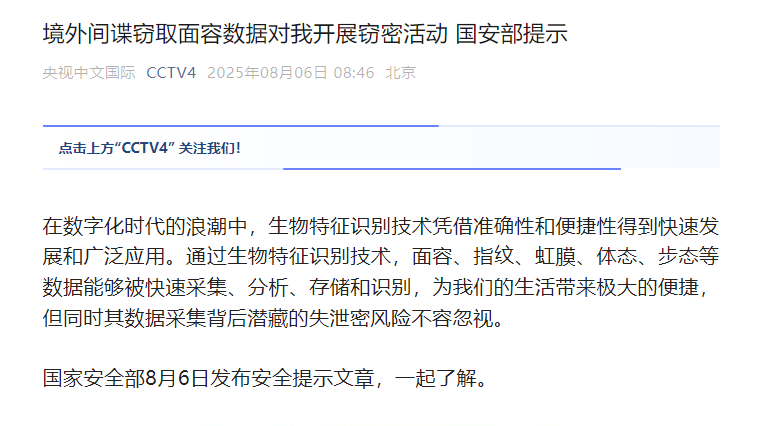August 6, 2025 — The Chinese Ministry of State Security issued a warning, stating that a foreign company is using the issuance of cryptocurrency tokens as a pretext to collect iris data globally, posing a serious threat to personal information security and even national security. This move has caused market turbulence and heightened concerns about biometric data privacy.

Worldcoin Suspected of Illegally Collecting Iris Data
The Chinese Ministry of State Security specifically named a foreign entity called "World Network" (also known as "Worldcoin"), claiming it is widely collecting users' iris data under the guise of issuing cryptocurrency. Worldcoin was co-founded by notable figures including OpenAI CEO Sam Altman, and its practice of generating digital identities and distributing cryptocurrency tokens through iris scanning technology has raised significant alarm from Chinese authorities.
The Ministry stated, "A foreign company is using the issuance of cryptocurrency tokens as an excuse to scan and collect the iris data of global users, posing a threat to personal information security and even national security." Iris data, as high-precision biometric information, is unique and immutable; once leaked, it could be used for identity theft or intelligence gathering, threatening personal privacy and national security.
Privacy Issues and Intensifying Data Localization Conflicts
In recent years, China has been strengthening its data security and privacy protection efforts. The "Data Security Law" and the "Personal Information Protection Law" explicitly require that the storage and processing of sensitive data (such as biometric data) comply with strict localization requirements. Additionally, China's recently launched centralized internet identity verification system further emphasizes the standardization of digital identities and localized data management. The iris data collection practices of Worldcoin are in clear conflict with China's stringent data sovereignty policies.
The Ministry's warning reflects China's ongoing concern over the cross-border data transmission by foreign entities. Although the statement did not disclose the latest developments regarding Worldcoin, analysts suggest that this incident may prompt China to tighten regulations on the collection of biometric data further.
Global Regulation and Market Response
China is not the first country to question Worldcoin's data collection practices. Previously, several countries, including France and Kenya, have launched investigations into Worldcoin's operations, focusing on whether it infringes on user privacy. The Coincu research team noted that the reevaluation of digital identity verification practices by various countries may lead to the introduction of stricter regulatory measures globally.
As a result of this news, the price of Worldcoin's WLD token has experienced fluctuations. The market's demand for transparency in privacy agreements is growing increasingly urgent, while Worldcoin and its founder Sam Altman have yet to respond officially to the matter. The cryptocurrency community and government agencies are closely monitoring the developments, and it is expected that cryptocurrency projects based on biometric technology will seek a new balance between innovation and security regulation.
Broader Industry Impact
According to the "2025 Cryptocurrency Crime Report" released by Chainalysis, the application of biometric data in the cryptocurrency field is raising alarms among global regulators. The collection of highly sensitive information such as iris data not only involves personal privacy but could also be used for illegal purposes, such as money laundering or identity fraud. Regulatory agencies in various countries may seize this opportunity to redefine the boundaries between cryptocurrency innovation and data security.
The warning from the Chinese Ministry of State Security highlights the sensitivity of biometric data in the global digital economy. As the controversy over Worldcoin's iris data collection continues to unfold, the global cryptocurrency industry may face stricter privacy scrutiny. In the future, companies will need to pay more attention to data security and compliance while promoting technological innovation to navigate the increasingly complex regulatory environment.
免责声明:本文章仅代表作者个人观点,不代表本平台的立场和观点。本文章仅供信息分享,不构成对任何人的任何投资建议。用户与作者之间的任何争议,与本平台无关。如网页中刊载的文章或图片涉及侵权,请提供相关的权利证明和身份证明发送邮件到support@aicoin.com,本平台相关工作人员将会进行核查。




